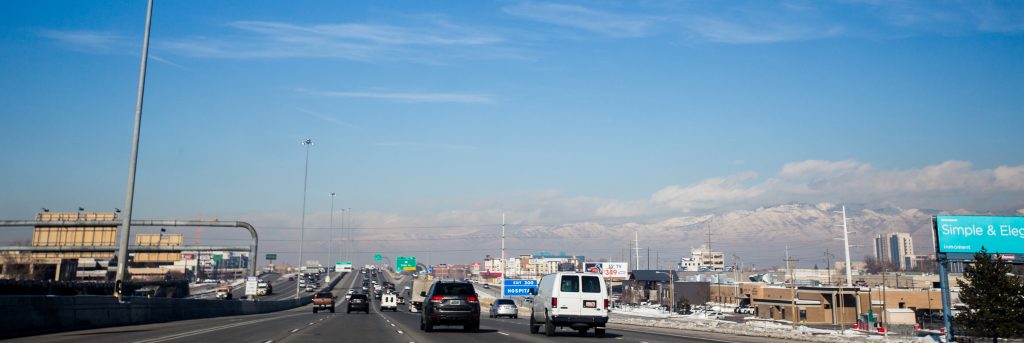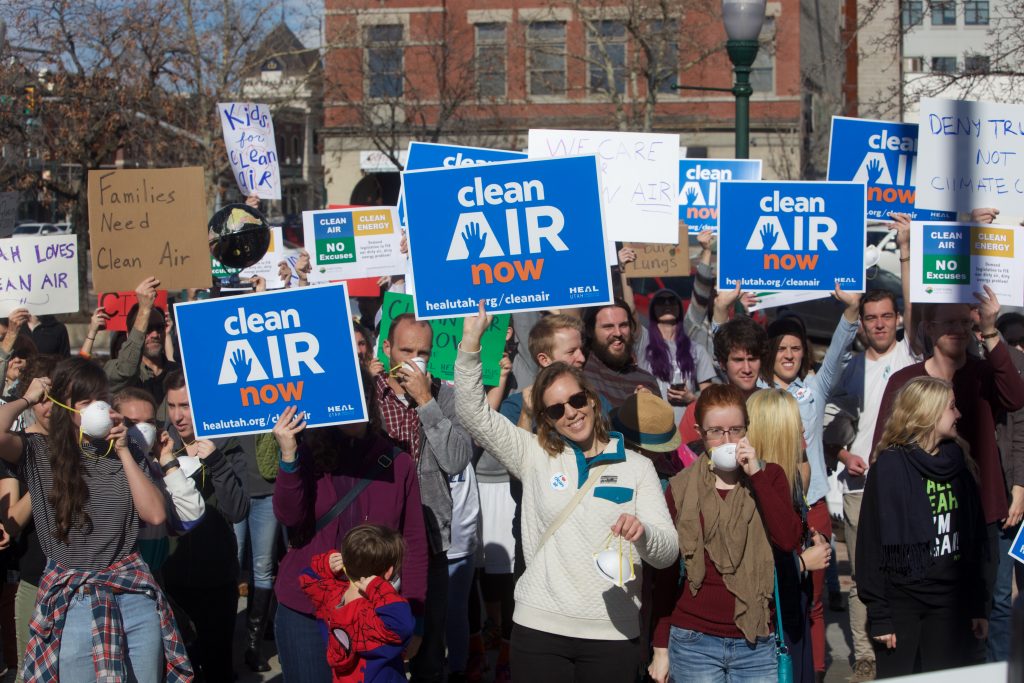
Utah has experienced especially poor air quality in comparison to the rest of the country this year.
According to airnow.gov, Utah cities recently topped the charts multiple consecutive days for worst air quality in the U.S., including Salt Lake City at the top spot on Jan. 31, Provo at No. 1 on Feb. 1, four Utah cities in the top five on Feb. 2 and Utah cities at the top three spots on Feb. 3.
The air gets especially bad during Utah winters when inversion is severe. Inversion normally occurs when a cold layer of air becomes trapped under a warm layer of air. Pollutants are trapped in the cold layer near the ground because the warm layer of air acts like a lid. Anyone exposed to these pollutants is negatively affected, according to Denni Cawley, executive director of Utah Physicians for a Healthy Environment.

“It affects everyone, even the healthy who don’t show any symptoms,” Cawley said. “Bad air quality is a public health hazard.”
Nathan LaCross, Utah Department of Health assessment section manager and epidemiologist, said air pollution particulates are a problem because they are small enough to get very deep into the lungs. People who are otherwise healthy might experience a variety of symptoms, including eye, nose or throat irritation and chest problems, LaCross said.
“In terms of whether it’s an issue of concern in Utah, it certainly is,” LaCross said. “It certainly does cause health effects and has impacts across the community.”
Former Eagle Mountain resident Jaclyne Loera said she saw changes in her own health and the health of others because of air pollution when she moved from Southern California to Utah.
While California cities typically top the charts for average air pollution, the multiple California cities Loera lived in did not make State of the Air’s three lists of the top 25 most polluted cities, while the Salt Lake City-Provo-Orem area placed seventh for the Short Term Particle Pollution list.
“I was just overall sick always in Utah, and the winters were the worst when the inversion was at its highest,” Loera said. “I couldn’t even leave the house without being ill.”
Loera said she experienced major respiratory problems. She recently moved to Austin, Texas and said her health has improved since the move.
Utah Division of Air Quality Toxicologist Steven Packham said it depends on who you talk to when it comes to the level of concern of air quality in Utah.
“The air pollution levels in Utah, particularly in the urban areas, are very much related to weather conditions,” Packham said. “As a whole, we are not as bad as some resources may suggest.”
Packham said while Utah’s bad air pollution days are severe, the number of those days in Utah are not nearly as high as other well-known urban areas.

Brian Moench said in his speech at Utah’s Valley’s First Clean Air Rally on Feb. 4 that young people are most affected by air pollution.
“For them, even short-term pollution events can cause irreversible developmental harm with life-long consequences,” Moench said.
Provo resident Kristina Taylor said she experienced these effects while raising her infant daughter Olivia. She said her family had a couple of scary experiences with Olivia’s health last year in which she stopped breathing.
“That was in September when she had no cold symptoms, so I know air quality plays a much bigger role for Olivia and other asthmatics in my family than we ever realized before,” Taylor said.
Moench said in his speech that while young people are the most affected by poor air quality, every person is affected to some degree.
“Air pollution is unhealthy, period — for anybody in any amount,” Moench said.
Despite having generally good health overall, Orem resident Daniel Rodziewicz said Utah’s bad air gives him respiratory health problems.
“I wake up every morning with a sore, dry throat,” Rodziewicz said. “I also get a cough through the winter, which often keeps me awake at night.”
Rodziewicz said he thinks better public transportation would imrpove Utah’s air quality.
“I think that the public transport system is awful, and it needs to be vastly improved before people with cars opt to use it,” Rodziewicz said.
Rodziewicz said he does not think busses contribute to clean air, and public transportation needs to be built with environmental impacts in mind.
The bipartisan Clean Air Caucus addressed these issues on Feb. 2 in its agenda on Capitol Hill. They introduced several bills that will take small steps to help improve Utah’s poor air quality.
Proposed House bills included funding to replace Utah’s old, polluting diesel school busses, to change requirements for operators of gasoline cargo trucks to prevent release of petroleum vapors and to increase requirements on emissions inspections.
In addition to several House bills, the Clean Air Caucus introduced Senate bills. One bill restricts community associations from placing unreasonable restrictions on solar panels.
Provo City has addressed Utah’s bad air quality in several ways, including releasing a Clean Air Toolkit. The kit’s main “tools” for individuals are to buy a cleaner car, drive less and make your home low-emission.
Packham said he participated in the release of an air pollution/outdoor exercise phone app called “My Air” as a public service.
“The app actually takes the latest air pollution levels by county, and it will calculate how long you can be active outside at some desired exertion level,” Packham said.
LaCross said one of the best things Utahns can do to avoid negative health effects from air pollution is to keep track of the air quality in their area and adjust their outside activity accordingly.




